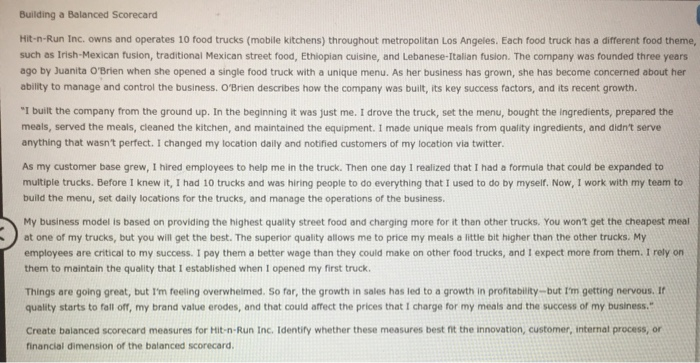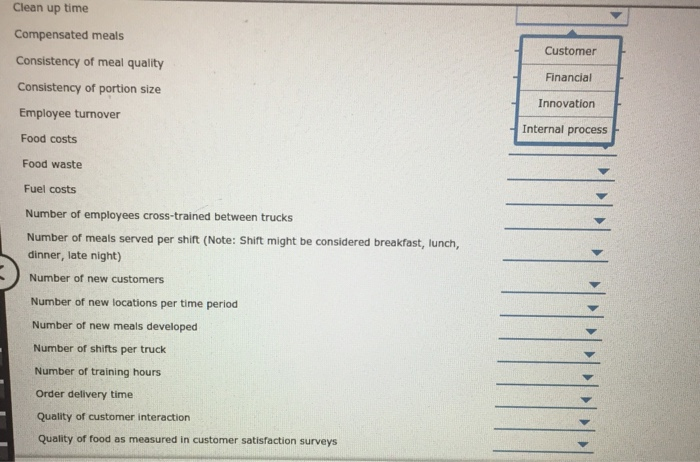Building a Belanced Scorecard Hit-n-Run Inc. owns and operates 10 food trucks (mobile kitchens) throughout metropolitan Los Angeles. Each food truck has a different food theme, such as Irish-Mexican fusion, traditional Mexican street food, Ethiopian cuisine, and Lebanese-Italian fusion. The company was founded three years ago by Juanita O'Brien when she opened a single food truck with a unique menu. As her business has grown, she has become concerned about her ability to manage and control the business. 0'Brien describes how the company was built, its key success factors, and its recent growth. "I built the company from the ground up. In the beginning it was just me. I drove the truck, set the menu, bought the ingredients, prepared the meals, served the meals, cleaned the kitchen, and maintained the equipment. I made unique meals from quality ingredients, and didn't serve anything that wasn't perfect. I changed my location daily and notified customers of my location via twitter. As my customer base grew, I hired employees to help me in the truck. Then one day I realized that I had a formula that could be expanded to multiple trucks. Before I knew it, I had 10 trucks and was hiring people to do everything that I used to do by myself. Now, I work with my team to build the menu, set daily locations for the trucks, and manage the operations of the business. My business model is based on providing the highest quality street food and charging more for it than other trucks. You wont get the cheapest meal at one of my trucks, but you will get the best. The superior quality allows me to price my meals a little bit higher than the other trucks. My employees are critical to my success. I pay them a better wage than they could make on other food trucks, and I expect more from them. I rely on them to maintain the quality that I established when I opened my first truck Things are going great, but I'm feeling overwhelmed. So far, the growth in sales has led to a growth in profitability -but I'm getting nervous. It quality starts to fall off, my brand value erodes, and that could affect the prices that I charge for my meals and the success of my business Create balanced scorecard measures for Hit-n-Run Inc. Identify whether these measures best fit the innovation, customer, internal process, or financial dimension of the balanced scorecard Clean up time Compensated meals Consistency of meal quality Consistency of portion size Employee turnover Food costs Food waste Fuel costs Customer Financial Innovation Internal process Number of employees cross-trained between trucks Number of meals served per shift (Note: Shift might be considered breakfast, lunch, dinner, late night) Number of new customers Number of new locations per time period Number of new meals developed Number of shifts per truck Number of training hours Order delivery time Quality of customer interaction Quality of food as measured in customer satisfaction surveys Quality of ingredients Quality of meal Retaining existing customers Set up time Speed of the experience (how quickly customers can be served) Time to sell out (how long it takes to sell out of meals during a shift) Building a Belanced Scorecard Hit-n-Run Inc. owns and operates 10 food trucks (mobile kitchens) throughout metropolitan Los Angeles. Each food truck has a different food theme, such as Irish-Mexican fusion, traditional Mexican street food, Ethiopian cuisine, and Lebanese-Italian fusion. The company was founded three years ago by Juanita O'Brien when she opened a single food truck with a unique menu. As her business has grown, she has become concerned about her ability to manage and control the business. 0'Brien describes how the company was built, its key success factors, and its recent growth. "I built the company from the ground up. In the beginning it was just me. I drove the truck, set the menu, bought the ingredients, prepared the meals, served the meals, cleaned the kitchen, and maintained the equipment. I made unique meals from quality ingredients, and didn't serve anything that wasn't perfect. I changed my location daily and notified customers of my location via twitter. As my customer base grew, I hired employees to help me in the truck. Then one day I realized that I had a formula that could be expanded to multiple trucks. Before I knew it, I had 10 trucks and was hiring people to do everything that I used to do by myself. Now, I work with my team to build the menu, set daily locations for the trucks, and manage the operations of the business. My business model is based on providing the highest quality street food and charging more for it than other trucks. You wont get the cheapest meal at one of my trucks, but you will get the best. The superior quality allows me to price my meals a little bit higher than the other trucks. My employees are critical to my success. I pay them a better wage than they could make on other food trucks, and I expect more from them. I rely on them to maintain the quality that I established when I opened my first truck Things are going great, but I'm feeling overwhelmed. So far, the growth in sales has led to a growth in profitability -but I'm getting nervous. It quality starts to fall off, my brand value erodes, and that could affect the prices that I charge for my meals and the success of my business Create balanced scorecard measures for Hit-n-Run Inc. Identify whether these measures best fit the innovation, customer, internal process, or financial dimension of the balanced scorecard Clean up time Compensated meals Consistency of meal quality Consistency of portion size Employee turnover Food costs Food waste Fuel costs Customer Financial Innovation Internal process Number of employees cross-trained between trucks Number of meals served per shift (Note: Shift might be considered breakfast, lunch, dinner, late night) Number of new customers Number of new locations per time period Number of new meals developed Number of shifts per truck Number of training hours Order delivery time Quality of customer interaction Quality of food as measured in customer satisfaction surveys Quality of ingredients Quality of meal Retaining existing customers Set up time Speed of the experience (how quickly customers can be served) Time to sell out (how long it takes to sell out of meals during a shift)









